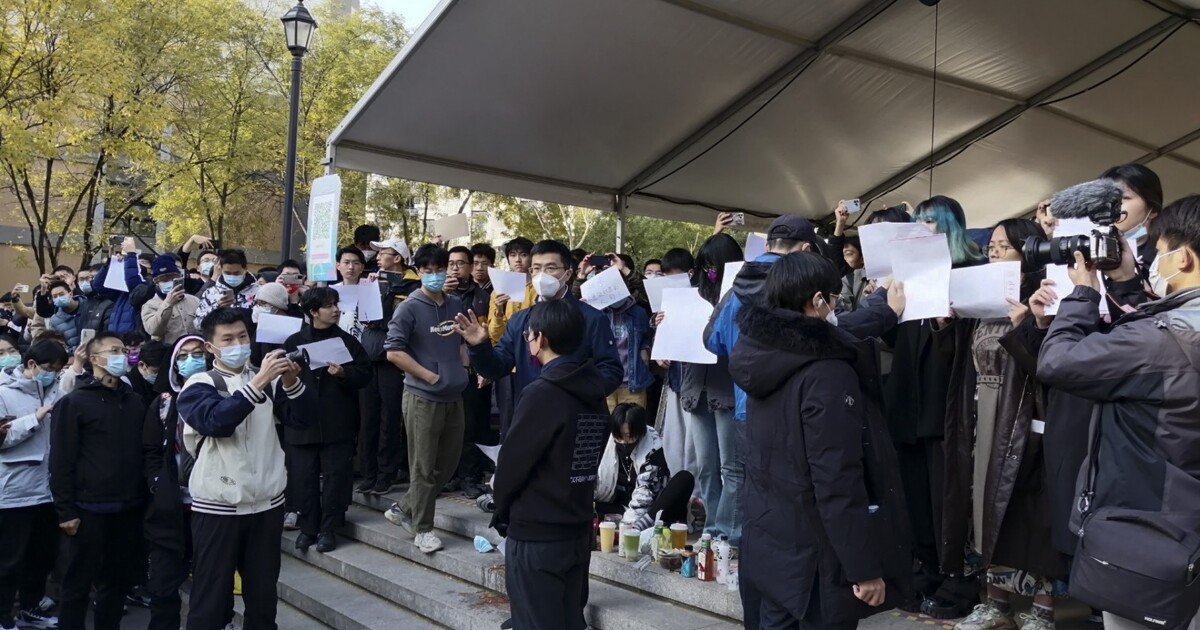

Chinese human rights lawyers are mobilizing on behalf of dissidents despite the risk of government retaliation following a wave of protests that reportedly forced Chinese Communist Party officials to close universities ahead of schedule.
“A fellow lawyer said it wasn’t appropriate and reminded me of the risks, but … I just want to provide them with whatever help I can,” lawyer Wang Shengshen told Radio Free Asia. “I want to thank them and … do anything in my power to support them at this time, or I wouldn’t be able to live with myself.”
Chinese cities have been rocked by mass protests against the regime’s “zero-COVID” policy, a heavy-handed testing and lockdown protocol that Beijing once hoped would showcase “a great contrast between ‘China’s orderliness’ and ‘the West’s chaos,’” as one senior official put it in 2020. Chinese officials have accused “forces with ulterior motives” of exaggerating the public discontent, but several internal analysts suggest that the surging anger of students and other dissidents has presented the authoritarian leaders with a difficult dilemma.
“There is a huge sense of public grievance right now, and the Tsinghua University students are up in arms,” a retired Chinese official quoted only by his surname also told Radio Free Asia. “If they mishandle this, the whole thing could explode, because regular people can’t carry on like this; they may as well fight.”
CHINA’S WHITE PAPER PROTEST: WHY ‘ZERO COVID’ ACTIVISTS ARE HOLDING UP BLANK SHEETS
That tension is the latest example of major domestic protests against a regime adversarial to the United States, a development that could complicate President Joe Biden’s initiatives to manage threats from China and Iran without stumbling into a risky confrontation.
“Our message to peaceful protesters around the world is the same and consistent: People should be allowed the right to assemble and to peacefully protest,” White House National Security Council spokesman John Kirby told reporters Monday. “Nothing’s changed about the president’s firm belief in democracy and democratic institutions and how important that is.”
Officials at Tsinghua University in Beijing reportedly are trying to mollify the students, who turned out by the hundreds on Sunday after 10 people died in a fire in Xinjiang province. The university administration met Monday with a group of student leaders, and they kept the meeting focused on the pandemic restrictions, according to reports.
“Nobody raised anything bigger,” a student attendee told the South China Morning Post. “The protest was directly triggered by the fire in Urumqi, but it was also because of long-term dissatisfaction over pandemic restrictions towards the government.”
The protesters poured scorn on the regime in their weekend demonstrations. “I want to ask: The foreign forces you are talking about, are they Marx and Engels,” one student, per a translation from the Spectator’s Cindy Yu, said in reference to the German philosophers who developed the philosophical basis of communist ideology.
“We can’t even access foreign internet, how are foreign forces meant to be communicating with us?” a second protester said.
“We only have domestic forces not allowing us to govern ourselves,” the first student responded.
Chinese Education Ministry officials reportedly have ordered colleges and universities to send students home while authorities try to corral the unrest.
“If the Chinese government announces the end of zero-COVID just because of popular protest, then it will give the impression that democratic protests are effective in influencing its decision-making,” a political commentator in Beijing, Si Ling, told Radio Free Asia. “That will spark further protests from the public … so they can’t afford to give any breathing room to street protests and demonstrations whatsoever.”
CLICK HERE TO READ MORE FROM THE WASHINGTON EXAMINER
In any case, the boldest Chinese lawyers will have their work cut out for them. “Our phones were blowing up because people had lost contact with their friends, and we found that people had been taken away in many different places, including Shanghai, Beijing, Ningbo, Kunming, Yunnan, and Guizhou,” said Wang. “Some people couldn’t understand why this had happened, and were shocked and hurt — they never thought they could come to any harm.”





